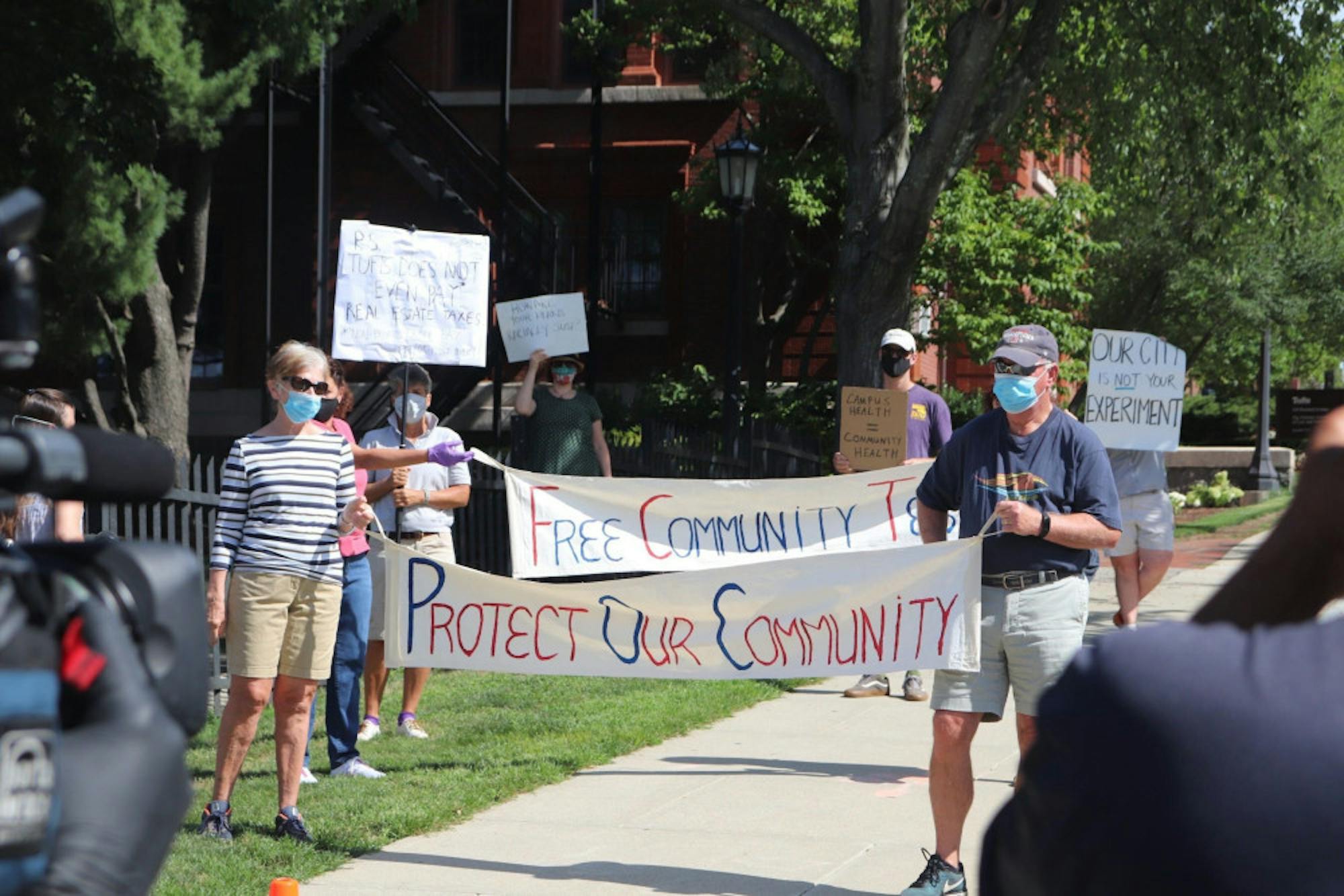In recent weeks, Tufts has come under fire from local mayors, legislators and residents for its reopening plan. Critics of the plan say the return of students from across the country and globe threatens to reverse the significant progress they have made in containing the pandemic.
In an Aug. 10 letter to University President Anthony Monaco, Somerville Mayor Joe Curtatone and Medford Mayor Breanna Lungo-Koehn called on the university’s leadership to make seven significant changes to its reopening plan, including a reassessment of the plan in conjunction with the community and cutting the number of students living on and off campus.
“Despite months of planning for a safe in-person return to class, and corresponding drastic changes to campus life, the virus is spreading widely at universities,”Curtatone and Lungo-Koehn wrote.
The mayors believe that by inviting students back to campus, the university is putting residents and other members of the community at risk.
"[The plan] will significantly increase the risk of transmission in our communities and catalyze a potentially unmanageable increase in infections as we enter the fall and winter seasons,” Curtatone and Lungo-Koehn said.
On Packard Avenue on Aug. 19, a small group of residents turned out to a protest organized by Our Revolution groups in Medford and Somerville to oppose Tufts' reopening plan.
During the protest, Marianne Walles, a Somerville resident, emphasized that the university's response to the pandemic is representative of the institution's neglect of community members and their needs.
“This is another example of where the Tufts administration does not care about the community around them and that they continue to make plans that could adversely affect our community and cause our residents to die,” Walles said.
Residents also clarified their reasons for hosting and participating in the protest.
“We don’t want to stop the education process of these students. That’s not what we’re here for,” Hendrik Gideonse (A'97), a Medford resident, said. “We’re here to ensure that fewer people catch this disease.”
Residents’ concerns ranged from the safety of custodians to the amount of time it will take to process all of the university’s COVID-19 tests, and many contrasted Tufts' approach to that of Somerville Public Schools, which is using a remote learning model.
Residents also opposed Tufts' plans at a special meeting with the Somerville City Council.
Some speakers said they see students as the greatest risk and recounted witnessing parties as the campus shut down in March or having seen bands of maskless students return to campus.
“I am 78 years old, and I have a daughter that is not so well,” resident Daisy Montsalve told the councilors. She, like many others, expressed concern that Tufts students will not obey the health and safety rules when they are off campus.
Others looked to the administration.
“I hold nothing against the Tufts students,” Connor Blanck (A'15) said. “But there are certain to be some among that student body who will not take this seriously. All it takes is a few mistakes for an infection at Tufts to spiral out of control ... I think this is an incredibly greedy and arrogant decision by the Tufts administration.”
However, in written testimony for the public hearing, Stephen Mackey, president of the Somerville Chamber of Commerce, expressed confidence in the university's leadership.
He underlined the money the university spends in the community and its continuous support.
"The faculty, staff, and students add millions more for our small businesses, restaurants, and family-owned shops," Mackey wrote.
The evening before the city council's meeting, Tufts held its own town hall for local residents in an effort to assuage concerns.
Over Zoom, Monaco, Associate Dean of Student Affairs Kevin Kraft, Vice President of Operations Barbara Stein, University Infection Control Director Michael Jordan, Tufts University Chief of Police Gerard "Chip" Colleta and Senior Vice President and General Counsel Mary Jeka fielded questions from the community, many of which centered on how Tufts intends to properly enforce its regulations.
“We’re trying to make compliance easy,” Monaco said. “We will be enforcing our policies. We understand that’s important to your safety and health and the safety and health of our Tufts community.”
Monaco and Kraft explained that there will be “student ambassadors” roving campus with masks, but that residents should call the university's police department if they see a gathering of more than 10 students or other unauthorized behavior.
Monaco also discussed that there will be consequences for students who do not adhere to the rules and noted that hosting a 40 or more person gathering could result in suspension from the university.
The university’s town hall, however, was not completely well received.
Multiple speakers at the Somerville City Council’s public hearing the next day described the town hall as “insulting” or “tone-deaf.” Residents also could not directly ask questions during the town hall and, instead, had to submit them in the comments section.
Christine Barber, who represents Medford and Somerville in the Massachusetts House of Representatives,Katjana Ballantyne and MaryJo Rossetti, both of whom are city councilors for Somerville, and Nichole Morell, a Medford councilor, also wrote a letter to Monaco.
The quartet of local legislators raised many of the concerns residents have and added that they may oppose Tufts’ lodging license if changes by the university were not made.
“Tufts’ reopening plan fails to address some very basic questions about safety,” they wrote.






